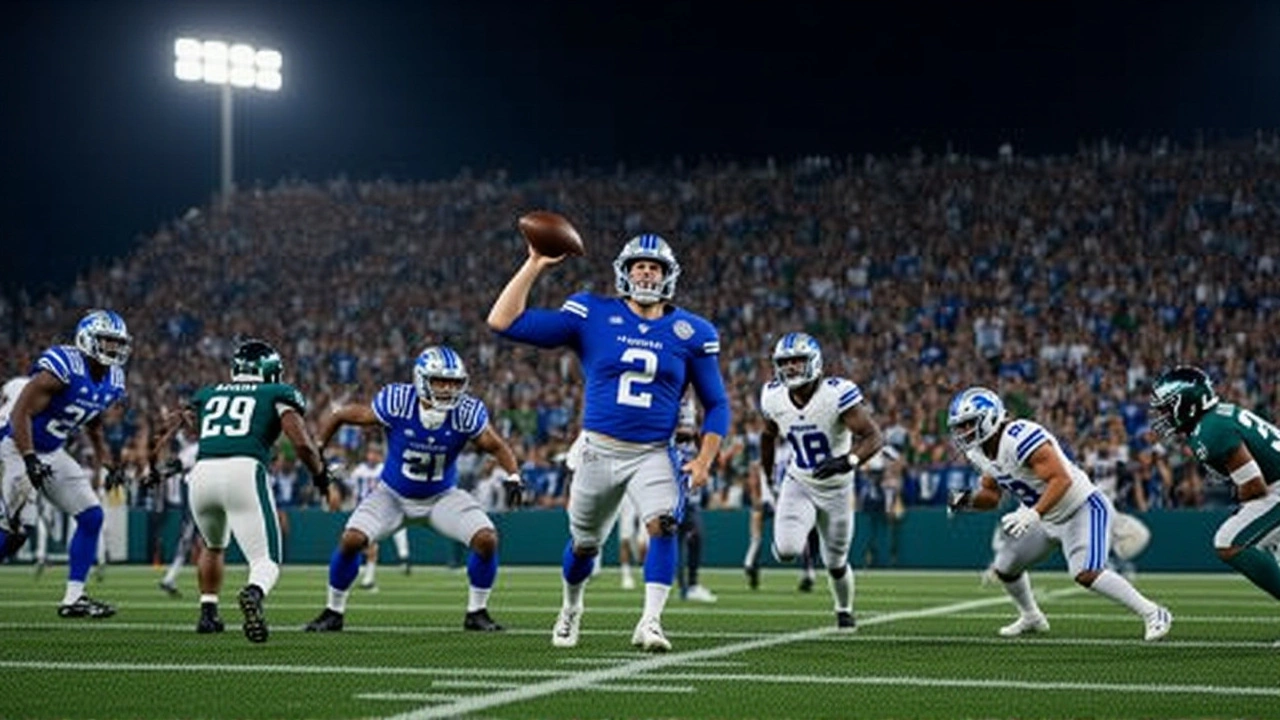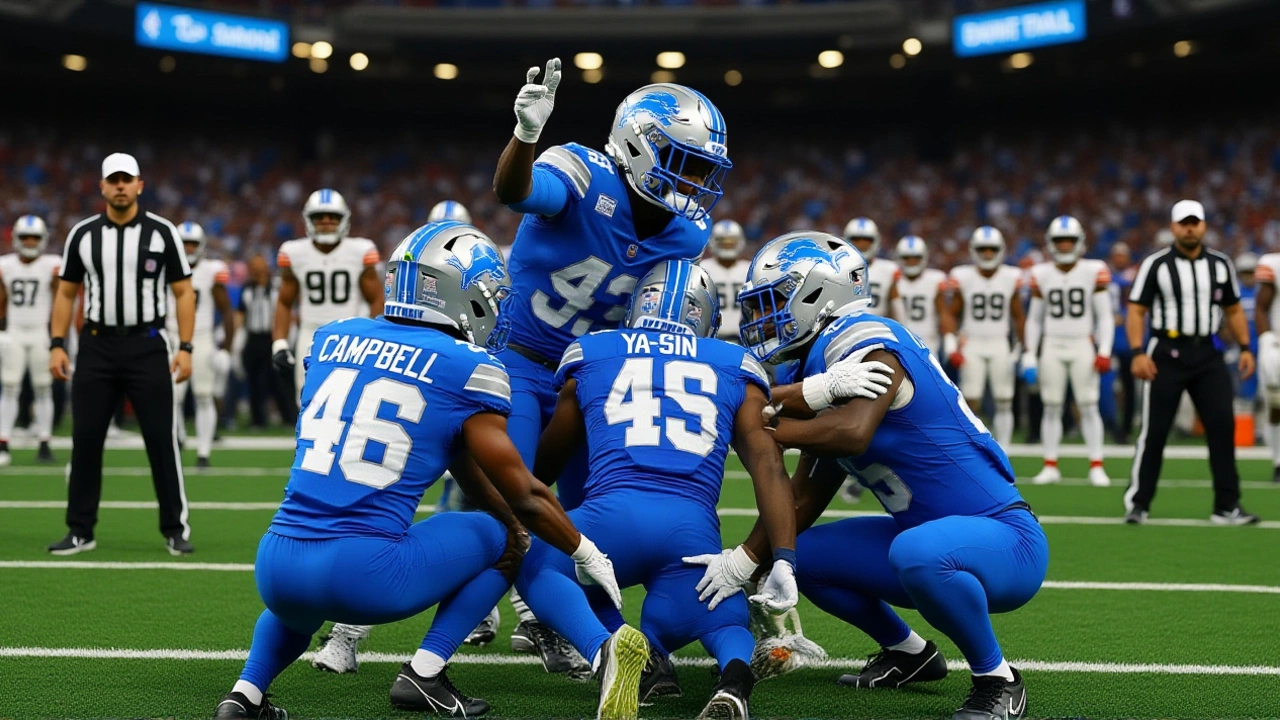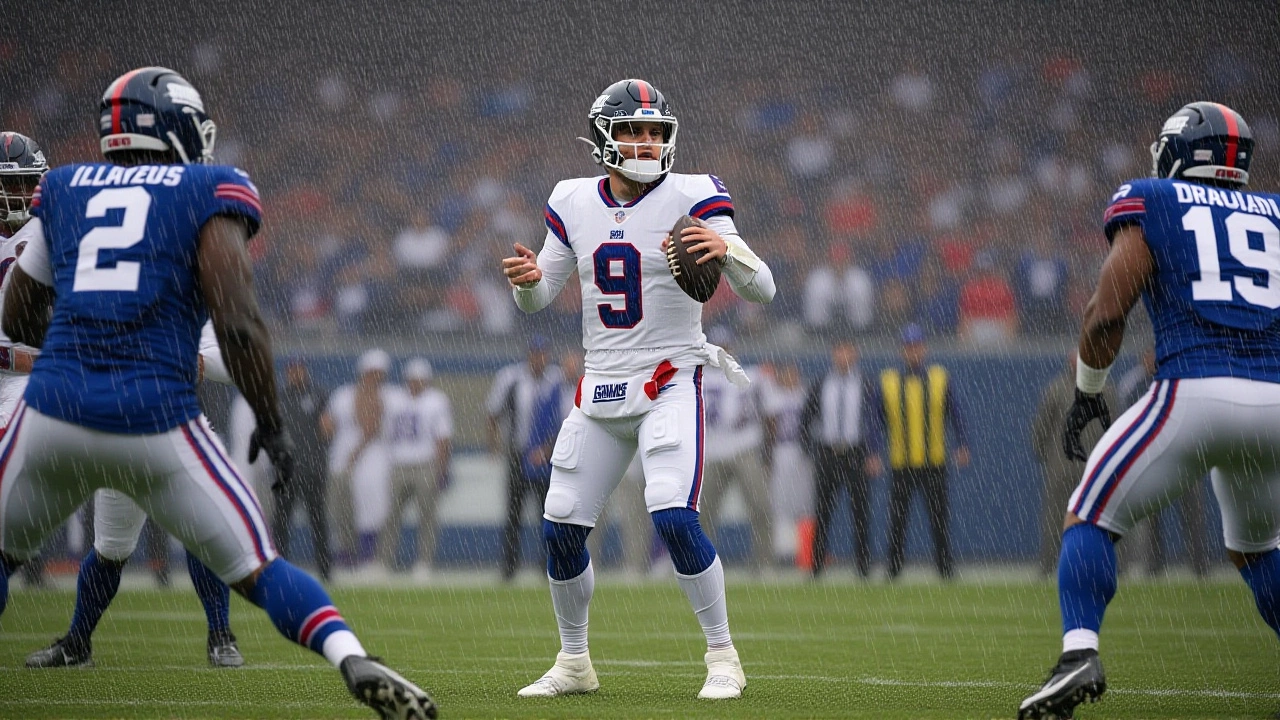Jahmyr Gibbs' 69-Yard OT Dash Lifts Lions Past Giants 34-27

- Nov, 24 2025
- 0 Comments
- Caspian Hartwell
It wasn’t supposed to end like this. With the Detroit Lions trailing by ten points late in the fourth quarter, their playoff hopes hanging by a thread, and a five-game losing streak looming over the New York Giants, the game at Ford Field on Monday, November 24, 2025, looked destined for another frustrating chapter. But then came Jahmyr Gibbs — a 5’9”, 202-pound dynamo with the speed of a sprinter and the vision of a veteran — and everything changed. His 69-yard touchdown run in overtime didn’t just win the game; it rewrote the narrative of the entire night.
A Game That Refused to End
The Giants came into Week 12 of the 2025 NFL season on a five-game skid, desperate to stop the bleeding. Their offense, led by quarterback Kyle Winston, had been sputtering, but on this night, they looked sharp. Tight end Theo Johnson hauled in a 22-yard touchdown in the second quarter, and a trick play — using Johnson as a fullback in the backfield — netted them a critical first down at the Lions’ 39-yard line late in the third. By the end of regulation, New York led 27-27 after a controversial decision: instead of taking a sure field goal on 4th-and-6 at the Detroit 28-yard line, Giants head coach Brian Daboll opted to go for it. Winston’s pass to Johnson fell incomplete. The crowd roared. The Lions smelled blood.That’s when Jake Bates, Detroit’s reliable kicker, stepped up. With 1:17 left on the clock and no timeouts, he lined up for a 59-yard field goal — one of the longest in franchise history under pressure. The snap, the hold, the kick — pure ice in his veins. The ball sailed through the uprights. The stadium erupted. 27-27. Overtime.
The Moment That Defined It
Overtime in the NFL is a coin flip — until it isn’t. The Lions won the toss, and on their first possession, they went no-huddle. Jared Goff, calm under pressure, hit running back Jahmyr Gibbs on a screen for six yards. Then a 12-yard scramble by Goff. Then, on second-and-8 from their own 31-yard line, Gibbs took the handoff, slipped a tackle at the line, and just… disappeared.He cut right, then left, then accelerated like a rocket. Giants safety Jaylen Reed lunged. Missed. Linebacker Azeez Al-Shaair reached. Too late. Gibbs was into the clear. The sideline turned into a blur of orange and silver. The crowd noise hit a pitch only reserved for playoff-caliber moments. He crossed the goal line with 3:14 left in overtime. The scoreboard read: Detroit Lions 34, New York Giants 27.
“I just saw the hole,” Gibbs said afterward, still catching his breath. “I didn’t even think about the end zone. I just ran. That’s what they pay me for.”
Hutchinson’s Quiet Heroics
While Gibbs stole the headlines, the real unsung hero was Aidan Hutchinson. The Lions’ captain and defensive end didn’t record a sack, but he was everywhere. He pressured Winston on five consecutive plays in the fourth quarter. He forced a fumble that was recovered by linebacker Alex Anzalone. And on that final drive — the one that ended with Gibbs’ touchdown — Hutchinson collapsed the pocket on third-and-10, forcing Winston to throw off-balance. The pass sailed high. Incomplete. The Giants had to punt.“He’s the engine,” said defensive coordinator Aaron Glenn. “He doesn’t need the stat sheet to know he’s making a difference. He just plays.”

What Went Wrong for New York
The Giants’ loss was as much about strategy as it was about execution. That 4th-and-6 decision — down 27-20 — was the turning point. Analysts later pointed out that even a 46-yard field goal would have put them up 30-27, forcing the Lions to score a touchdown to win. Instead, they gave Detroit life.Winston, who threw for 247 yards and two touchdowns, admitted after the game: “We had chances. We didn’t take them.” His two interceptions — one off a tipped ball by Lions cornerback Cam Akers, another on a miscommunication with Johnson — were costly. And the Giants’ offensive line, already banged up, gave up five pressures in overtime alone.
“We had the game in our hands,” said Johnson, who had six receptions for 82 yards. “We just didn’t finish.”
Why This Matters
For the Lions, this win snapped a two-game losing streak and improved their record to 8-3, putting them firmly in the NFC North driver’s seat. With six games left, they now control their playoff destiny. Gibbs’ breakout performance — his third 60+ yard run of the season — signals he’s not just a complementary back anymore. He’s the explosive weapon they’ve been missing since D’Andre Swift’s departure.For the Giants? Their sixth straight loss drops them to 3-8. The playoff math is brutal. They need to win out, hope for a Falcons collapse, and pray for a miracle tiebreaker. Even their fans at MetLife Stadium started chanting “Fire Daboll” by the final whistle.

What’s Next?
The Lions host the Minnesota Vikings next Monday — a crucial divisional showdown. Gibbs will be under more scrutiny than ever. Can he carry the load? Can Goff stay healthy? And will the defense keep up the pressure?For the Giants, it’s a trip to Green Bay to face Aaron Rodgers and the Packers. Another loss could mean the end of their season — and maybe even Daboll’s tenure.
Behind the Numbers
- Jahmyr Gibbs: 22 carries, 158 yards, 1 TD (69-yard OT winner)- Jared Goff: 23/31, 214 yards, 1 TD, 1 INT
- Kyle Winston: 24/37, 247 yards, 2 TD, 2 INT
- Theo Johnson: 6 rec, 82 yards, 1 TD
- Aidan Hutchinson: 8 tackles, 3 pressures, 1 forced fumble
- Jake Bates: 3/3 FG (including 59-yarder), 4/4 PAT
- Turnovers: Lions 1, Giants 2
- Time of possession: Lions 32:18, Giants 27:42
Frequently Asked Questions
How did Jahmyr Gibbs’ 69-yard TD compare to other Lions overtime winners?
Gibbs’ 69-yard run is the longest overtime touchdown in Detroit Lions history, surpassing Barry Sanders’ 67-yard scamper against the Packers in 1997. It’s also the longest OT TD by any running back in the NFL since 2020, when Derrick Henry ran 70 yards for the Titans. This wasn’t just a big play — it was franchise-defining.
Why did the Giants go for it on 4th down instead of kicking the field goal?
Coaches often choose to go for it when they believe their offense can convert and secure a win outright, rather than risk giving the opponent a chance to tie with a touchdown. But with the Giants up only 27-20 and under two minutes left, kicking a field goal would’ve made it a two-score game. Instead, they gave Detroit life — and the Lions capitalized.
What role did Aidan Hutchinson play beyond the stats?
Hutchinson didn’t just pressure Winston — he disrupted the Giants’ rhythm for the entire second half. His presence forced Winston to rush throws, altered blocking schemes, and allowed the Lions’ linebackers to flow freely. He’s become the emotional anchor of a defense that’s improved by 18% in points allowed since Week 5.
Is this win enough to put the Lions in the Super Bowl conversation?
Absolutely. At 8-3, the Lions now lead the NFC North and have the second-best point differential in the conference. With Gibbs emerging as a true star and Goff playing his cleanest football in years, they’re no longer a team that just competes — they’re a team that wins in the clutch. The path to the Super Bowl is narrow, but it’s open.
What’s the significance of the ‘former Wolverine’ mentioned in the broadcast?
The reference was to Lions offensive lineman Taylor Decker, a Michigan alum who started at right tackle. He played all 65 snaps and allowed zero pressures, helping open lanes for Gibbs’ big runs. It’s a subtle nod to Michigan’s pipeline of NFL talent — and how deeply rooted the Lions’ roster is in Big Ten football culture.
How does this loss affect the Giants’ future?
At 3-8, the Giants are officially out of playoff contention. The next three months will be about evaluation: Will Winston be the long-term answer? Can Johnson develop into a true No. 1 tight end? And will general manager Joe Schoen make major changes this offseason? This loss doesn’t just hurt the record — it could reshape the franchise’s direction.